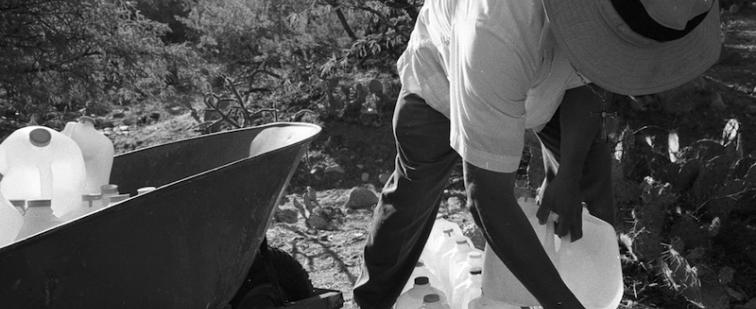Home
On Sunday, September 27, a violent conflict broke out in El Estor, a municipality near Guatemala's Pacific coast, between members of a Q'eqchi' community called Las Nubes and private security guards of the Guatemala Nickel Company (CGN), a subsidiary of the Canadian mining company, Hudbay Resources. Community members report that CGN's security forces kidnapped and killed Adolfo Ich Xamán, a local teacher and community leader, and gravely injured eight others.
On October 9 a United Nations human rights panel issued a warning concerning the presence of contracted foreign paramilitary forces operating inside Honduras. According to the UN Working Group on the Use of Mercenaries, an estimated 40 members of the infamous United Self-Defense Forces of Colombia (AUC) have been hired by wealthy Honduran landowners to defend themselves "from further violence between supporters of the de facto government and those of the deposed President Manuel Zelaya." As Zelaya's Foreign Minister Patricia Rodas notes, it is widely believed that these mercenaries are being used to "do the dirty jobs that the armed forces refuse to do."
The decision by a Miami court on October 13 to reduce Antonio Guerrero's life sentence to 22 years imprisonment is the latest chapter in the ongoing legal battle to free a group of men known as the Cuban Five. The case is inextricably linked to the ongoing standoff between Havana and Washington. In the early 1990s, the Cuban government sent a group of men to the United States to infiltrate violent anti-Castro organizations, which had been operating from Miami with apparent impunity since the 1960s. After these anti-Castro organizations orchestrated the bombings of Cuban hotels and the shooting down of a Cuban passenger aircraft near Barbados in 1976, the Cuban government decided to take covert actions, believing that Washington was not interested in preventing more attacks.
During Hugo Chávez's tour of nine countries across northern Africa, western Asia and Europe in early September, the Venezuelan president orchestrated the signing of a flurry of energy accords. Much ink was spilled over Chávez's agreement to exchange oil for machinery and technology with the West's favorite pariah, Iran. But the most far-reaching commitments Chávez secured on his trip took place in Moscow—a series of accords with Russian oil and gas firms to develop a block of the massive Orinoco belt in northeastern Venezuela, one of the largest oil fields in the world.
As Mexico's bloody crackdown on drug trafficking continues, Guatemala's physical location and recent military ties to Mexico make it an inevitable haven for Mexican drug cartels seeking to continue doing business. Guatemala, however, is far less equipped to handle the burgeoning problem than its larger and wealthier neighbor, and now drug-related corruption and violence are being added to the seemingly interminable list of challenges to this small country's hope for democratic peace and security.
The battle over the waters of Lake Parón, in the Northern Andes of Peru, came to a head during the late afternoon hours of July 29, 2008, when over 100 farmers from Huaylas province of the Department of Ancash took over the hydraulic operations of the Cañón del Pato Hydroelectic Center. The farmers were protesting the nearly 50% drop in Lake Parón's water levels following the center's release of the lake's water in order to enhance its power production capabilities. Cañón del Pato is operated by Egenor Duke Energy, a large, private energy corporation owned by Duke Energy International, a subsidiary of Duke Energy headquartered in Charlotte, North Carolina.
The announcement in mid-July of the near completion of an agreement to allow the U.S. military to lease space at seven Colombian bases prompted nearly unanimous rejection from South American governments. Now, other South American nations have begun to arm themselves, fueling fears of an arms race in a region that has not suffered a major inter-state conflict since the end of the Chaco War in 1935.
The crisis could finally push Mexico over the brink, into disaster. According to the country's weekly news magazine Proceso, "unemployment, increasingly costly public services, family debt, and desperation because of hunger" as a result of this crisis, "are causing increasingly violent reactions. The fed-up clamor in a wide array of the population, that is now becoming more evident, could soon become what, although some see it as far-fetched, many think is entirely possible: A social explosion."
The Honduran de facto regime suspended constitutional guarantees to civil liberties, including freedom of assembly and freedom of the press, for 45 days on the eve of mass protests planned to mark the three-month anniversary since the coup d'etat against President Manuel Zelaya took place. The regime has also shut down Radio Globo, a prominent independent media outlet that has covered anti-coup activities and that reportedly has a journalist inside the Brazilian embassy where Zelaya is staying, and TV station Channel 36.
In a bold move, the democratically elected president of Honduras Manuel Zelaya—ousted in a military coup in June—has returned to Tegucigalpa, entering the country in secret, traveling overland with a small group of advisers. He is currently in the Brazilian embassy, and crowds of supporters are gathering around the building to demand the restoration of Honduran democracy.












